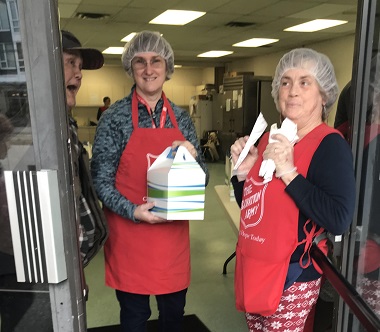
Volunteers at Salvation Army Boundless, offering ‘to-go’ lunches. Photo: Karen Giesbrecht
Restrictions, closures and social distancing affect all of us – but none more than vulnerable populations clustered in the Downtown Eastside but increasingly found throughout Metro Vancouver.
Groups like The Salvation Army, Union Gospel Mission and community meal hosts are scrambling to adapt to rapidly changing conditions.
While they strive to make conditions safe for those with whom they work, they could all use extra support right now, including from the provincial and federal governments.
The Salvation Army
The Salvation Army always has hundreds, maybe thousands, of people working to help the disadvantaged across Canada. But during the COVID-19 pandemic they are closing all their churches and their national leader has directed that “During these days, all Salvation Army officers are emergency disaster services responders.”
Jonathan Evans, director of Salvation Army Vancouver, told me:
The big thing for us is that demands have increased while supplies have plummeted due to the ideas of scarcity and rushing at the grocery store. The key message we have is that we are open and responding.
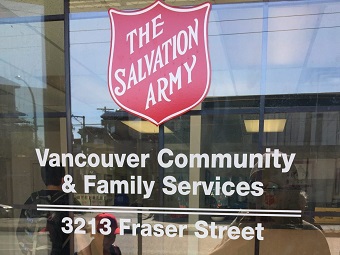
Evans posted Coronavirus, Vancouver and The Salvation Army:
Many of our grandparents told us those stories from WW1 where when they needed socks, donuts, somewhere to be warm and safe – they could turn to “The Sally Ann.”
The Salvation Army was right there with those soldiers, on both fronts, caring for and loving their neighbours.
The same exists today. We know God cares for people. He taught us that the greatest love is when we lay down our lives for each other. Our staff and volunteers are positioned on the front lines now to offer food and resources. Even more, we offer a listening ear and a caring heart. . . .
You can help those with the most need in Vancouver by donating new cleaning supplies and non-perishable food to our office at 3213 Fraser Street. If you do not have supplies please consider donating to us so we can approach wholesalers for essential supplies.
Go here for the full comment.
You can get in contact with The Salvation Army in Vancouver through its website, or on social media: IG: https://www.instagram.com/
The Salvation Army’s Vancouver Harbour Light posted a statement March 18: ‘COVID-19 impacts on Harbour Light programs’:
Dear friends:
These are unprecedented times for all of us – each day we learn more about how we can care for ourselves and others, and work together to flatten the curve. At Harbour Light, we are closely monitoring the spread of COVID-19, taking a cautious, informed approach to our planning.
We aim to maintain as many services as possible in all our programs; however, the health and well-being of our hundreds of residents, hundreds of daily community guests, staff and volunteers is our top priority. With this in mind, we’d like to update you on the current changes to our programming and services.
Community meals
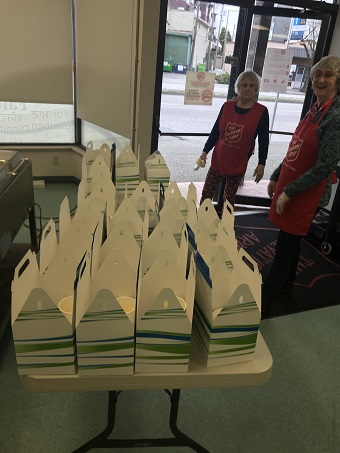
Meals ready to go at Boundless Vancouver. Photo: Karen Giesbrecht
Out of an abundance of caution, we made the difficult decision to limit our community feeding program to “to go” meals only starting Friday afternoon, March 13th.
This decision was not made lightly. This action will help us to ensure the required levels of sanitization and social distancing protocols necessary to minimizing the risk of virus transmission to clients and community guests, a great many of whom are elderly or immune compromised.
Caring for our neighbours remains the priority for Harbour Light, and we will continue to do our very best to provide meals to our DTES community. For the foreseeable future, our community meal program will offer 250 bagged lunches “to go” every day at approximately 11 am.
Residential programs
Our residential sheltering, detox and treatment programs will continue to serve those experiencing homelessness and seeking recovery from addiction.
Go here for the full statement.
Community meal programs
Karen Giesbrecht works with both The Salvation Army and Union Gospel Mission, and is a food network coordinator with Planted: a community food network. She said community meals are carrying on, but are in a state of flux.
Kits Cares Café
She wrote me March 18:
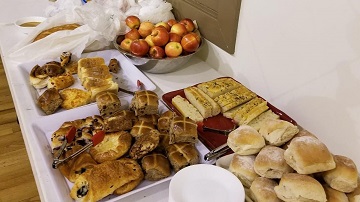
Kits Cares Café normally meets every Thursday evening.
We had a conference call last night with the Kits community meal (Kits Cares Café) volunteers. We had hoped to make a salmon chowder that we could send in take-away containers (we’d already purchased the ingredients), but Kits House is shut down, and won’t let us access their kitchen.
The local churches – which provide volunteers for the meals – are also closed, so we cannot cook in one of them.
Our plan this week (at the moment) is to:
- Get some fruit and packaged items (granola bars, cheese strings, yogurt . . . whatever we can find).
- Have some volunteers meet any guests that might show up – to share a bit of food, and to check on how people are doing.
-
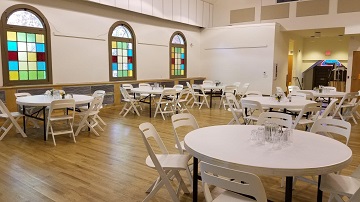
The dining hall for Kits Cares Café.
Have some hand sanitizer and encourage guests to keep some distance from each other if a line does form.
- Phone some local cafés to see if anyone will donate coffee/tea.
Kits House has allowed us to gather outside their building on Thursday; the Neighbourhood Houses are very cautious, understandably. Thankfully, it’s a nice day. Hopefully, by next week, we’ll find a kitchen we can cook in.
DTES charities
Giesbrecht added that she is having regular conference calls with the head chefs of the DTES charities:
With things changing so rapidly, no one knows what to do.
We discussed today that restaurants and catering companies have been generous with surplus food they won’t use in light of so many closures, but the biggest need is refrigerated, food-safe way to transport it to food programs. The City is helping to coordinate that.
Oasis Café
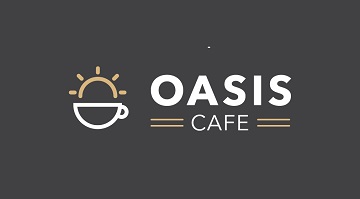 Debbie Hawker, director of local engagement for Tenth Church, wrote me March 18 about the Oasis Café which is located in the church:
Debbie Hawker, director of local engagement for Tenth Church, wrote me March 18 about the Oasis Café which is located in the church:
- Oasis Café at Tenth Church is a community meal, open on Monday nights and Tuesday afternoons. Their typical structure, like others, is a sit-down meal, but recently they had to adjust their program to providing food for take-away. They welcomed about 85 people on Monday, and 55 on Tuesday – close to their usual amounts. When other community meals are suspended, these numbers demonstrate the vitality and importance of community meal programs now, if not even more-so in the upcoming weeks.
- Many guests were grateful that food was still provided. However, despite offering a basic need, there remain others unfulfilled. Through this all, social isolation is becoming a tough reality for many. Several guests expressed their sadness over the disruption and inability to connect, and enjoy the Feast that God provides with new and familiar faces. In a time of scarcity, we recognize that God gives generously, so we respond in like manner as best as we can.
Union Gospel Mission
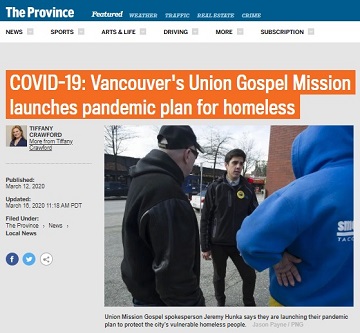 The Province ran a story about Union Gospel Mission (UGM) launching a pandemic plan for the homeless (March 12, updated March 16). It began:
The Province ran a story about Union Gospel Mission (UGM) launching a pandemic plan for the homeless (March 12, updated March 16). It began:
The Union Gospel Mission (UGM) in Vancouver is launching a pandemic plan to protect the homeless from a COVID-19 outbreak.
UGM spokesman Jeremy Hunka said there is no indication that the illness has surfaced in the homeless community, but they’re taking emergency steps to care for those who are most at risk.
“Our guests are among the more vulnerable and would be among the hardest hit if a widespread outbreak occurred in Metro Vancouver, and that is a big concern,” he said in a statement Thursday.
Hunka said the plan includes six phases and was originally developed in 2009 as a response to the H1N1 flu. It includes a management team to coordinate an emergency response, increasing sanitation and preventive education to protect guests, staff and volunteers, and suspending large group tours.
Go here for the full story. CTV News and News 1130 did stories as well.
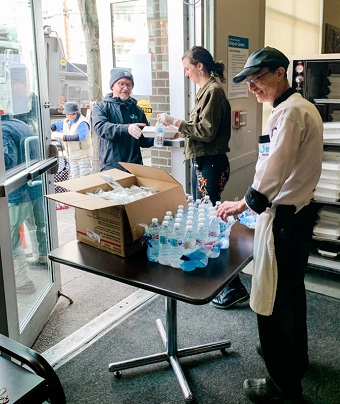
UGM is distributing ‘to-go’ meals from its doors now.
UGM released a statement, updated March 18, about how it is responding to the pandemic:
How are we ensuring the safety of our community? At this time, the following new steps are being taken:
- Implementing social distancing measures around UGM.
- Maintaining essential services like meals, while adjusting program delivery to minimize the risk of transmission. This means that, instead of gathering hundreds of people inside our dining room together, we will begin offering hot meals ‘to-go’ through our doors. This reduces risk and follows the advice of health authorities to limit public gatherings to fewer than 50 people.
- We are increasing the number of meals we are serving daily to help more people during this time. This includes 50 extra meals at lunch, and possibly more in the future.
- Adjusting our shelter operations if necessary. UGM is fortunate that our shelter was designed specifically with dignity and illness control in mind. The shelter consists of six smaller rooms, rather than one large space that everyone shares. Still, we will be preparing to implement more social distancing in our shelter.
- Adjusting or suspending select non-essential services such as:
- Cornerstone Drop-in: We will serve coffee or water through the doors of UGM during drop-in hours, instead of having our community guests gather inside as usual. This will create connection with our community but limit gatherings of large people, following the advice of BC health authorities.
- Clothing Room: Our clothing room will not be open to the larger community at one time, but instead we will respond to emergency situations as they arise to get people clothing they need.
- All of our efforts will start being geared toward continuing our essential services of shelter, meals and 24-7 front desk.
Go here for the full statement and for future updates.
Looking ahead, they added: “Our Easter Major Meal (originally scheduled for April 11) will now be changed to a smaller Easter Ham Dinner with only our homeless guests and staff in attendance.”
Government support?
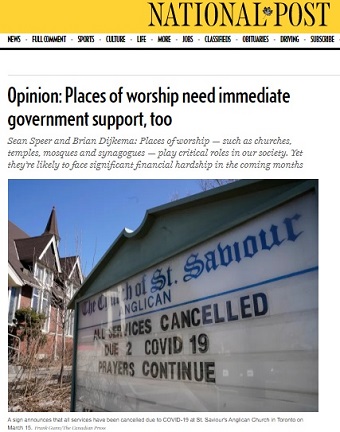 A comment written by Sean Speer and Brian Dijkema in response to Prime Minister Justin Trudeau’s promise of financial relief March 18 made a good point about places of worship.
A comment written by Sean Speer and Brian Dijkema in response to Prime Minister Justin Trudeau’s promise of financial relief March 18 made a good point about places of worship.
While they are not uniquely devoted to helping vulnerable people in the way the Salvation Army and Union Gospel Mission are, they do, nonetheless, have a significant role:
Finance Minister Bill Morneau has indicated that the government is “preparing a significant stimulus program” to help businesses and households facing economic hardship due to the coronavirus epidemic. . . .
It’s important, however, that the government thinks comprehensively about who will need support. Most of the discussion thus far has understandably focused on businesses and households.
But other parts of Canadian society will also face financial challenges due to mandated closures, declining household spending and ongoing uncertainty.
An important case in point are places of worship, such as churches, temples, mosques, synagogues and so on. These institutions play critical roles in our society, including offering front-line services to needy people in many communities. Yet they’re likely to face significant financial hardship in the coming weeks and months. The challenges may even be existential for some institutions with small and aging congregations. . . .
Research by Cardus shows that “for every dollar in a religious congregation’s annual budget, a city gets an estimated $4.77 worth of common good services.” These services will be especially important for the vulnerable communities hardest hit by the inevitable economic downturn.
Go here for the full comment.
Broad response
It is good to note how widespread – well beyond the doors of the church or mission agencies – the desire to help our neighbours has become during the pandemic. For example, see:
BBC News posted Coronavirus: Kind Canadians start ‘caremongering’ trend March 16.
